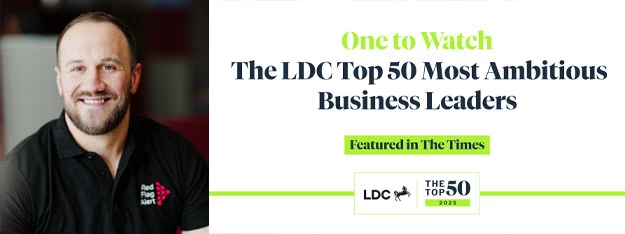Articles

Learn how to stay compliant and avoid costly mistakes, to prepare your business for the new Construction Industry Scheme 2026 rules.

Clear answers to the most common ACSP and ECCTA questions, including identity verification, Companies House obligations and practical compliance steps

National Timber Group’s collapse into administration highlights the risks of prolonged financial strain and supply chain disruption in construction.

Combat the rising threat of digital asset fraud with expert insights and proactive strategies. Stay ahead of evolving scams and protect your business.

The FCA has replaced the SRA and now oversees anti-money laundering compliance for law firms. Discover the implications of this shift for your practice.

Richard West, CEO of Red Flag Alert, has been recognised as One to Watch in The LDC Top 50 Most Ambitious Business Leaders 2025, supported by The Times.

Learn what accountants operating in 2025 need to know to manage compliance, reduce risk exposure, and protect clients in an evolving global landscape

Red Flag Alert launches our new International Reports for all users, providing global UBO data, detailed credit scores and extensive company financials.

How can you prepare for compliance under the ECCTA? Find out what the ACSP rules mean for accountants, and how to prepare under new regulatory laws

AML compliance is a strategic necessity for law firms. Learn how AML, PEPs, and sanctions checks protect your practice and ensure regulatory compliance.

In a volatile market, financial due diligence in the construction industry is critical to avoiding risk and preventing bad debt. Red Flag Alert can help

The threats posed by money laundering are increasingly complex. You need a risk-based approach from Red Flag Alert to properly protect your organisation.

Streamlined onboarding is an essential part of the customer journey. Red Flag Alert Automate helps with digitising this process, quickly and easily.

Collecting overdue invoices is a must if a business is close to insolvency. In this article we look at how an effective credit control system can help

Read Rich West, CEO of Red Flag Alert, and his five essential tips to help insolvency practitioners leverage data to drive efficient, long-term growth

A seamless onboarding process is essential for improving customer retention and reducing churn. It also drives long-term revenue growth for your business.

Discover how to streamline your AML onboarding process to reduce friction, boost compliance, and deliver a seamless customer experience from day one

In this article we explore the UK construction sector’s outlook, key causes of insolvencies, and ongoing challenges facing the industry.

This blog explores how effective due diligence and credit risk management can protect businesses from financial risk, late payments, and cash flow crises.

Begbies Traynor share expert insights on business and credit risk in this guest article, offering powerful advice from the UK’s top insolvency practice.

Take a look at the trends that look set to define the construction industry in 2025.

High insolvency, budget related wage cost rises, cost increases: What else will challenge the construction industry?

Explaining the process of checking individuals, companies, or transactions against government-issued sanctions.

Take a look at the expected trends to influence personal credit for UK businesses in 2025, using Red Flag Alert consumer reports can help avoid bad debt.

Dive into the international UBO landscape and see how different nations manage beneficial ownership, including the USA and the European Union.

Learn how UBO transparency is key to robust AML practices and financial security. Red Flag Alert is the ultimate AML Compliance solution, see why.

Discover the key UK laws on UBOs and how they impact your business compliance and anti-money laundering efforts as well as the future of UBO regulation.

In this blog, Red Flag Alert examines the largest and most significant fraud cases the UK has faced in recent years.

In this article we look at the growing concerns of fraud in the construction industry as well as the types of fraud that are evident in construction.

In this article, we look at the types of external business fraud including: Embezzlement, Payroll fraud, Skimming, Invoice fraud and Expense Fraud.

In this article, we explore the 6 most significant fraud cases in history, from the 1600s to 2023 with FTX.

Red Flag Alert identifies top reasons accountants fail ICAEW AML assessments: inadequate risk assessments and more.

See the Top 5 reasons lawyers should digitally transform their practice which will give them the competitive edge and reduce waste within the business.

Financial distress in football is a growing concern, with clubs across Europe facing significant challenges.

In this article we look at what eKYC is, as well as the differences between eKYC and manual KYC. We also look at why you should perform eKYC Checks.

Red Flag Alert launch an exciting product set to take the UK by storm that helps businesses analyse if clients have late filed accounts of concern.

The UK's 2024 Anti-Money Laundering (AML) Regulations introduce significant changes impacting the regulated sector.

In this article, we dive into what a liveness check is, and how they help your business with fraud prevention in a modern society where fraud has evolved.

What is Identity Verification (IDV)? In this article we explain what IDV is and how it works with in our product - the ultimate solution for your business

In this article, we look at why company monitoring is key to Accountants with RFA having the fastest alerts to keep you informed before anyone else.

In this article, we look at why you should accept a Company voluntary agreement (CVA) and what are the advantages of accepting a CVA.

In this article we look at the top 5 benefits of digital transformation for Accountants & how it will improve your practice, financially and operationally

Learn how to use Red Flag Alert as an Accountant to improve your practice development while implementing strategies that give you a competitive advantage.

In this article, we look at a continuously struggling construction sector with yet another large construction company going insolvent -Everest 2020 Limited

Telefonica Tech UK Ltd reported a £365 million loss due to redundancy costs and a £1.8 billion impairment.

Which clubs are struggling and what's to come?

Geoffrey Osborne Ltd has filed for administration after 58 years, resulting in around 100 job losses.

The European Union has established an anti-money laundering authority in Frankfurt, Germany. See how this could affect your business.

In this article, we look at the updated regulations for domestic PEPs in 2024 for anyone in the United Kingdom and how businesses will be affected.

Streamline AML compliance with Red Flag Automate to ensure smooth client onboarding while staying fully compliant.

Explore major money laundering cases since the 1990s, including Wachovia Bank's £380B scandal and HSBC's £1.2B fine.

What Does AML Mean for the Financial Sector? In this article we dive into the importance of AML to financial institutions including regulation

In this article, we explain what the Financial Action Task Force (FATF) is and what they do to counter money laundering and terrorist financing.

In this blog, we explore how the Red Flag Alert platform predicted the business failure of Stephens And Stephens Ltd.

Conducting a Companies House search is essential for due diligence, offering insights into a company's legal status.

In this article, We look at how our platform's Analysis features allow and aid a deeper level intelligence than any other B2B Data.

In 2023, major firms like Binance ($4B), Crown Resorts ($450M), and Deutsche Bank ($186M) faced record AML fines.

What is the difference between Ultimate Beneficial Ownership (UBO) vs Persons of Significant Control (PSC)?

In this article, we look at how early our clients are alerted to winding up petitions intention via the Red Flag Alert platform with email alerts as well.

In this article, we look at how our solutions will cleanse your data as well as the benefits to integrating your B2B Data into your CRM

Understanding corporate group structures & identifying Ultimate Beneficial Owners (UBOs) are crucial for AML compliance.

Red Flag Alert's company monitoring tool is best in class, in this article, we see why our credit risk monitoring is a market leader.

See how Red Flag Alert's Growth Score is revolutionising how businesses find growth within the UK economy whether it be private or public sector.

In this article, we explain what document verification is as well as how it is used to meet AML Compliance regulations in the UK.

In this article, we explain the hierarchy of business insolvency and where you may fall when you're trying to get your money out.

In this article we elaborate on the regulatory obligations with regard to PEPs and Sanctions in the UK and best practices to follow

Implementing Know Your Supplier (KYS) procedures involves verifying suppliers' identities.

In this article we look at how we had signalled distress within Mobi Market Limited over 8 months before their intention to appoint an administrator.

Read our article and find out how we predicted Recycling Lives Limited's insolvency 9 months early.

This article looks at how we predicted the TXM Plant Limited insolvency 10 months early and how this can protect you from bad debt

In this article, read how we spotted the signs of business distress at Communisis and flagged them as a potential credit risk as early as September 2023.

In the UK, conducting Know Your Customer (KYC) checks is legally mandated for businesses in regulated sectors.

In this article, we take a deep dive into Zombie Companies- what they are, as well as what types of zombies companies are evident in the uk economy

Red Flag Automate boosts efficiency, reduces staff hours, and ensures compliance in the regulated sector.

In this article, we explain what Bank Account Verification is and the risks associated with not using it as part of your KYC process.

In this blog, we explore digital transformation and how Red Flag Automate can boost your business’s efficiency.

In this blog, we explain how automating business decisions can revolutionise practices and drive growth.

Red Flag Alert's very own, Richard West, has been named on this year's 42 under 42 list which is awarded annually by Insider Media.

This article looks at the differences between Smurfing and Structuring while elaborating on what each of these activities include in money laundering.

In this article, we explore onboarding challenges and how Red Flag Alert can help turn them into a business advantage.

Why are Gazelle companies perfect for you to target? Read this article to find out why you should be directing your sales efforts towards Gazelles

In this blog Red Flag Alert assess where the UK is experiencing growth in the North of England as well as who is considered the King in the North.

The UK government has tightened up its efforts around AML compliance, making some key changes to the UK Gambling Act of 2005 to make betting safer

This article provides insight as to why a company would get a First Gazette Notice and how you can mitigate the risks of insolvency.

This article defines what a shell company is as well as how shell corporations work, including the warning signs that you're dealing with a shell

This article analyses the collapse of various Gallagher rugby teams in the last few years including that of the Warriors, Wasps and London Irish

In this article, Red Flag Alert define a Phoenix company and the difference between a phoenix company and phoenixing with detrimental effects.

This blog analyses the collapse of the Buckingham Group and how the Red Flag Alert platform predicted their financial fall with the insolvency risk score

The UK sees another high street giant fall as Wilko appoints administrators and are bound for insolvency, this blog tells you everything you need to know.

What do Credit Risk Managers do? This blog explores their daily tasks and their importance to the business.

Red Flag Alert explains what a PEP (Politically Exposed Person) is and how to conduct enhanced due diligence with them.

What is a biometric login? how does a biometric password relate to KYC? Red Flag Alert explains how privacy and security have adapted with new technology

Foresight & Uncapped invest £4.5 Million pounds into Compliance, Business Credit checking and Insolvency risk scoring platform, Red Flag Alert.

In this article we talk about Sales data, what is sales data? What it can be used for and where you can find sales data without wasting your time.

Adverse media checks are key in business due diligence. This article explains screening and why it’s essential.

In 2023, UK businesses faced rising energy costs, with 64% experiencing increases in gas and electricity bills.

This article describes what a public limited company is and what a private limited company is, as well as the difference between PLC and Ltd.

in this article we look into the Carillion failure unravelled while explaining the importance of an industry-leading credit reference agency for businesses

Red Flag Alert's insolvency risk scorecard accurately predicted the Arcadia Group's collapse: find out how.

An article about identifying some of the key considerations and practical remedies that can help mitigate the risk of supplier insolvency for businesses.
For our quickest response simply call us on 0330 460 9877 and speak to an expert now!